Acne/Rosacea
(*Disclaimer: Please note that treatment results will vary from individual to individual.)
SOLIHULL MEDICAL COSMETIC ACNE CLINIC
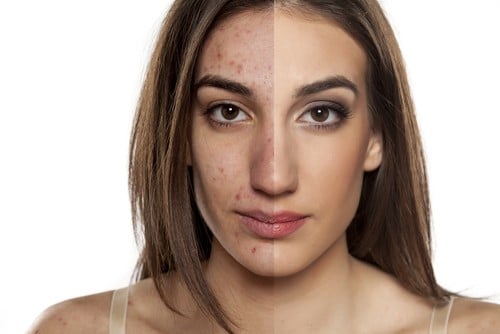
“There is no single disease which causes more psychic trauma, more maladjustment between parents and children, more general insecurity and feelings of inferiority and greater sums of psychic suffering than does acne vulgaris.” – Sulzberger & Zaldems, 1948
The Solihull Medical Cosmetic offers one of the only medical cosmetic acne clinics in the Midlands offering a complete range of acne treatments to suit all skin types. As well as a cosmetic specialist, Dr Sagoo is also a GP with decades of experience and can offer a range of holistic prescribed medication, as well as cosmetic acne treatment programmes, to enhance and improve acne prone skin. The acne clinic has gained national recognition with clients from all over the UK visiting the clinic for acne concerns.
As a result we have been selected to be one of the first UK acne centres of excellence under the guidance of world renowned dermatologist Professor Chu in association with Skin Med. Therefore demand for our services is high with a several week waiting list for an initial free assessment.
Why choose us for Acne?
We tend to see many clients who have been to other skin clinics and have not achieved the results they desired or expectations have not been met. Usually they have been misinformed or have not received the correct treatment. We provide a holistic treatment plan which may include use of the best lasers in the world along with medical grade acne skin products and combining that with using the latest in acne treatments available.
What is acne?
Acne is a common skin condition characterized by plugged pores (blackheads and whiteheads), inflamed pimples (pustules), and deeper lumps (nodules). Acne may occur on the face, chest, back, and upper arms. Although most teenagers get some form of acne, it can also develop in adults. Often, acne clears up after several years, even without treatment. However, it can also be disfiguring and upsetting to the client. Untreated acne can leave permanent scars, and to avoid acne scarring, acne treatment is important.
Different Types of Acne
Acne is not caused by dirt. Human hormones increase during adolescence and stimulate the sebaceous glands of the skin to; enlarge, produce oil, and plug the pores, therefore causing acne. Whiteheads (closed comedones), blackheads (open comedones), pimples (pustules), and occasionally cysts (deep pus-filled lumps) form. Adult acne develops later in life and may be related to hormones, childbirth, or stopping the pill.
Grades of Acne
-
Grade 1 Acne
This is the mildest form of acne. Grade 1 consists of blackheads mostly on the nose and a few papules which are small, red breakouts typically found on the cheeks. These breakouts are minimal and tend to be occasional.
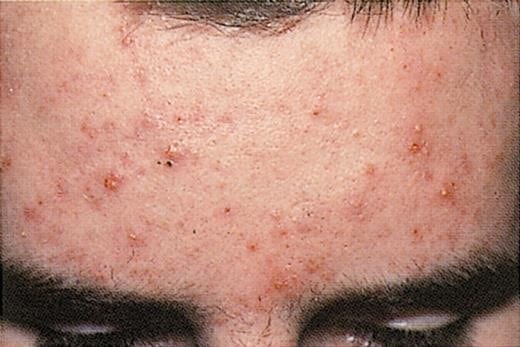
-
Grade 2 Acne
This is considered moderate acne and is characterised by blackheads, milia (whiteheads), inflammation, redness, papules and pustules. They are found usually on the nose, cheeks, and chin / jaw line. More than occasional, Grade 2 acne needs more active attention.
-
Grade 3 Acne
Very similar to Grade 2 but with more swelling, and the number of actual papules and pustules is increased significantly. Scarring tends to be more noticeable as well. In this case, it is found all over the face and neck in addition to other acne-prone areas such as the chest, back and upper arms.
-
Grade 4 Acne
It is the most severe form of acne and is extremely rare. Usually the skin is covered by an extreme number of pustules and oedema (swelling).
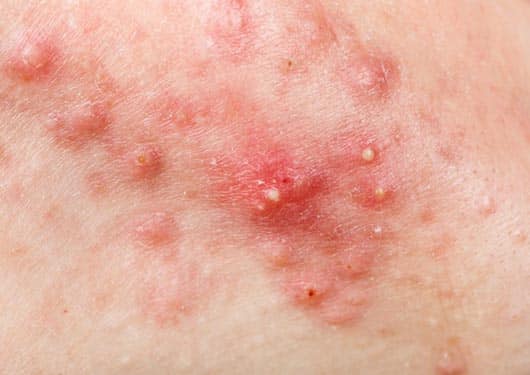
Acne Facts
-
Cleansing
Acne has nothing to do with not washing your face. However, it is best to wash your face with a mild cleanser (e.g. Cetaphil) and warm water daily. Washing too often or too vigorously may actually make your acne worse. Exfoliating once or twice per week (depending on skin type) with an exfoliant (e.g. Exfoliating cream) is recommended, as it may be useful for opening up blackheads and whiteheads, and fading acne marks and scars.
-
Diet
Acne is generally not caused by foods. However, if certain foods seem to make your acne worse, try to avoid them. In a few cases, milk/dairy or nuts may aggravate acne.
-
Cosmetics
To help keep your skin clear from acne, wear as little cosmetic product as possible. Oil-free, water-based moisturizers and make-up should be used. Choose products that are labeled “non-comedogenic” i.e. should not cause whiteheads or blackheads. Remove your cosmetics every night with mild soap or a gentle cleanser with water. Our clinic offers a medicated range of skin care products for acne-prone skin that has been shown in research to fight against acne.
Treatments
Treatment is an on-going process, and improvement in acne takes time. Each individual acne client will have a comprehensive skin assessment with Dr Sagoo and his skin specialist aesthetician to determine what the best treatment plan would be for that individual.
Each individual acne client will then be discussed, along with their own personal acne skin treatment plan, by Dr Sagoo and his skin aesthetician. They will work as a team to regularly review ongoing treatment and follow the client together on the journey of improving their skin. We recognise that most of the clients that have come to our clinic have had their confidence affected by their acne, and often find that their own doctors are unsympathetic.
Diet and lifestyle factors will also be discussed and addressed during the treatment plan, along with realistic expectations of what can be achieved. Treatments are broad and varied but are offered using the latest treatments available, as one of the Midlands leading clinics.
Medical Treatments
-
Topical creams
Dr Sagoo may prescribe certain medications for your acne. These could include topical creams, gels, or lotions with vitamin A acid-like drugs, benzoyl peroxide, or antibiotics to help unblock the pores and reduce the bacteria that cause acne. As a practising GP for last decades, Dr Sagoo can also prescribe prescription acne medication and liaise with your GP if necessary following his assessment.
-
Oral
– Antibiotics taken by mouth are often prescribed for acne.
– Birth control pills may improve acne, and may be used specifically for the treatment of acne. Birth control pills are particularly effective in women in whom periods are irregular, or who notice flare-ups before each period, or have more lower face (e.g. around the mouth) and jawline acne. Dr Sagoo can prescribe the birth control pill, or it can be prescribed by your GP.
– In cases of unresponsive or severe acne, vitamin A derivatives may be used. Patients using these medications must understand the potential side effects of this drug. Monitoring with frequent follow-up visits is necessary. Pregnancy must be prevented while taking the medication, since these substances cause birth defects Dr Sagoo works alongside two consultant dermatologists who can prescribe this medication.
– Women may also use birth control pills or medications that decrease the effects of male hormones to help with their acne.
-
Cosmetic Treatments
- As well as medical treatments, Dr. Sagoo will assess each client, and depending upon the severity of their acne will then discuss a treatment programme tailored to each individual client. The clinic offers a wide range of cosmetic acne treatments.
- Rejuvalight (diode) light therapy, using blue/red light wavelengths, which may help to reduce acne bacteria and therefore prevent flare ups
- Microdermabrasion may be used to remove the upper layers of the skin, which may improve irregularities in the surface, contour, and the generation of new skin.
- Chemical peels with glycolic acid or salicylic acid may help to unblock the pores, open blackheads and whiteheads, and minimize marks and acne scarring. The clinic offers a full range of chemical peels from superficial to medium depth peels to treat mild / moderate / severe acne.
We use 2 main types of peels:
Glycolic Acid Peels
Glycolic Acid peels may be able to remove the trapped “glue” that blocks the pores leading to spots (see below)
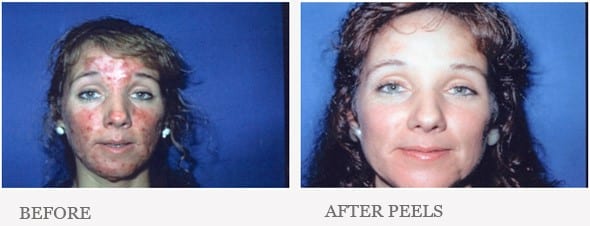
(*Disclaimer: Results will vary from person to person.)

(*Disclaimer: Results will vary from person to person.)
Glycolic acid also helps to repair damaged skin and may stimulate the generation of new skin cells, which may help improve acne scarring and may also prevent outbreaks of acne spots.
Salicylic Acid Peels
Enerpeel® SA targets skin remodeling and is designed specifically for sufferers of acne, thanks partly due to the sebostatic (oil production reducing) effect of Salicylic Acid. The solution also contains the two active ingredients that are present in Aknicare® - triethyl citrate and ehtyl linoleate - which were shown in a clinical trial by Professor Tony Chu to reduce the four main visible signs of acne.
-
IPL Limelight
The limelight IPL is a very powerful medical grade intense pulsed light that may improve the texture of the face as well as significantly reduce the redness associated with acne flare ups. Furthermore it may also help reduce the hyperpigmentation left behind from repeated acne flare ups. It is a powerful tool, especially when combined with other treatments, and may reduce the effects left behind by the acne.
-
Laser Photorejuvenation
Laser genesis is a great no-downtime, painless procedure that may help with acne prone skin. The laser's heat may help reduce the bacteria in active breakouts. This means they may dry up and heal much more quickly. Any red tones or discolorations from present or previous breakouts may be lightened as well. With most acne patients, large pores tend to be an issue, and the laser genesis may improve this as well. In addition to acne benefits, the procedure may also have anti-aging effects. Collagen production may be stimulated; therefore, it may decrease the appearance of fine lines and make the skin feel more elastic.
Patients typically have 3 to 5 treatments which can be spaced out 2 to 4 weeks apart.
-
Fractional Radiofreqency /Fractora (LATEST TREATMENT)
Treating active acne by the leading acne skin clinic in UK
Exclusive NEW Breakthrough in treatment of active acne as well as acne scarring by targetting where acne starts… in the sebaceous glands.
(*Disclaimer: Please note that treatment results will vary from individual to individual.)
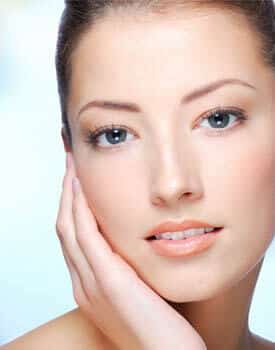
(Disclaimer: Results will vary from person to person.)
Solihull Medical Cosmetic Clinic 1st in UK to offer this new treatment
Advantages:
- Radio frequency waves may damage the oil producing glands that cause acne
- Simultaneous collagen stimulation may improve acne scarring
- Long term result for active acne may be permanent after a few treatments
- Safe in all skin types including Asian and dark skin (compared to laser)
Fractora Active for my skin
The Solihull medical Cosmetic Clinic under the supervision of leading skin specialist Dr Victor Sagoo is set to become a national Acne and Rosacea Association UK (ARA UK) accredited treatment centre for acne and rosacea by President and Founder, Professor Tony Chu.
The clinic is the first and currently only clinic in the UK to offer this treatment specifically for active acne, and may significantly improve moderate to severe active acne as well as acne scarring at the same time by targeting and suppressing the over active oil producing glands (sebaceous glands ) which cause active acne under the skin. The treatment is safe in all skin types including Asian and black skin. The treatment is called Fractora Active.
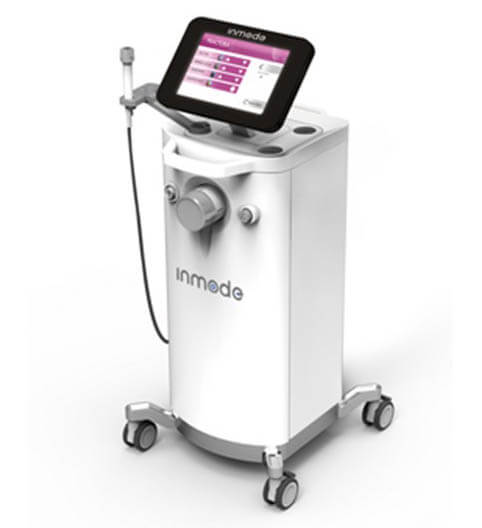
The Science behind Fractora Active Technology

Fractionated RF energy found in Fractora Active has been shown in scientific studies to reduce wrinkles. It is minimally invasive, using a matrix of micro-pins with the goal of resurfacing and restoring the skin, and may provide exceptional results with minimal patient downtime. Fractora Active delivers targeted bipolar RF energy to various selectable depths in the skin.
Fractora is the most advanced fractional radio-frequency treatment, and may provide anti-aging improvements on skin tone and texture for a more radiant appearance through ablation and skin resurfacing.
Fractora Active delivers RF energy to the skin through an array of pins, producing localized heat and small micro-lesion dots in the treatment area. These micro needles will go deep, with the goal being to heat and destroy the sebaceous (oil producing) glands.
(*Disclaimer: Results will vary from person to person.)
The pins in the sub dermal tissue may promote collagen restructuring, for skin rejuvenation and an improved appearance in the skin. The result is that the active acne may significantly calm down, which may lead to long lasting improvement in the acne skin condition.
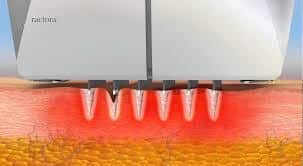
Radio frequency heat ablation and sebaceous gland suppression
Medical Evidence based
A study carried out on 8 patients with moderate to severe acne and different skin types and scarring over 2 year follow up showed that all 8 patients demonstrated significant improvement of acne lesions, acne scarring, pores and skin texture. The results improved further with time. The conclusion of the study was that fractional radio frequency is a safe and effective treatment modality for active acne and acne related scars with long term improvement by targeting overactive sebaceous glands.
“Dear Dr Sagoo thank you so much for helping me improve my skin. I have suffered from severe acne for as long as I can remember. After researching acne clinics your clinic came up as one of the best in the country offering the latest and new approaches to acne management. The Fractora Active treatment for me has significantly improved my acne and calmed down the painful red spots to my chin and cheeks that I have been so self conscious about. You have succeeded where others have failed . I am so glad I found you to help me . 6 months on my skin still feels calm … Thank you for giving me back my confidence… you are the best!” JB Birmingham
(*Disclaimer: This is the opinion of this individual and results may vary from person to person.)
Results
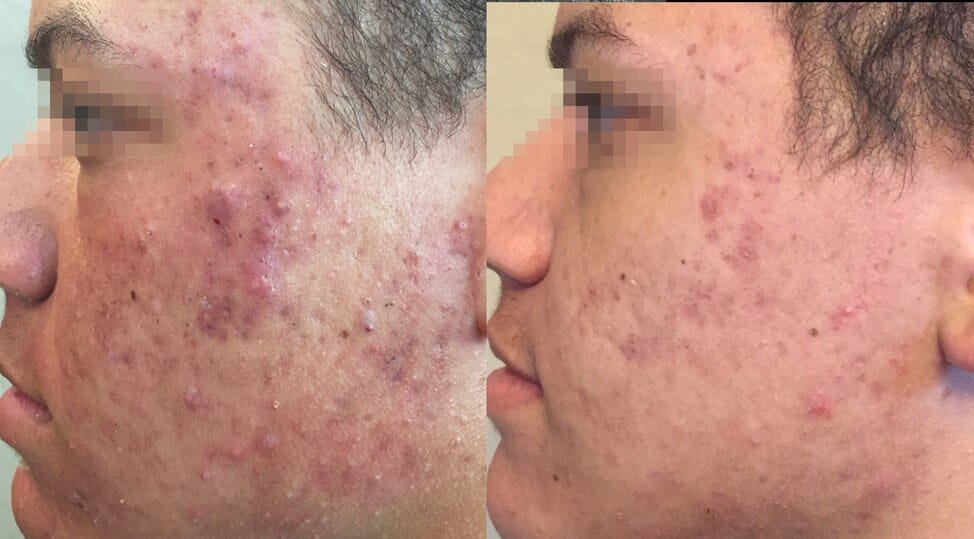
Before and after Fractora Active 4 treatments
(*Disclaimer: Results will vary from person to person.)
How Many Treatments are Needed?
Depending on your Fractora treatment regime, you can expect to have about 4 sessions 1 month apart, if the goal is to achieve a significant reduction of active acne. Occasionally, to achieve further improvement, additional treatments may be required
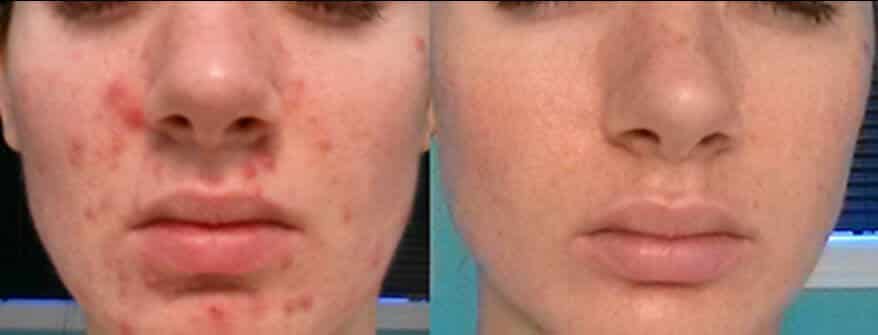
Before and after 4 treatments Fractora Active
(*Disclaimer: Results will vary from person to person.)
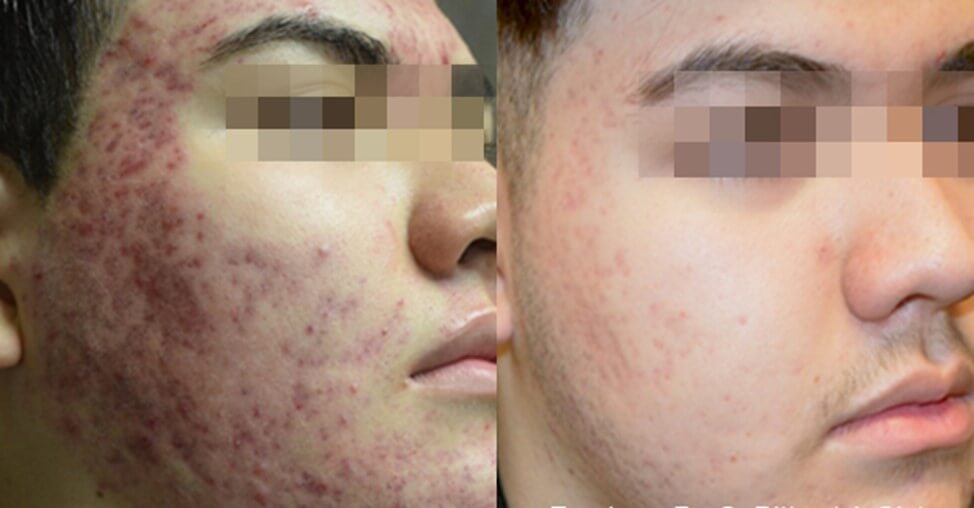
Before and after 6 monthly treatments with Fractora Active
(*Disclaimer: Results will vary from person to person.)
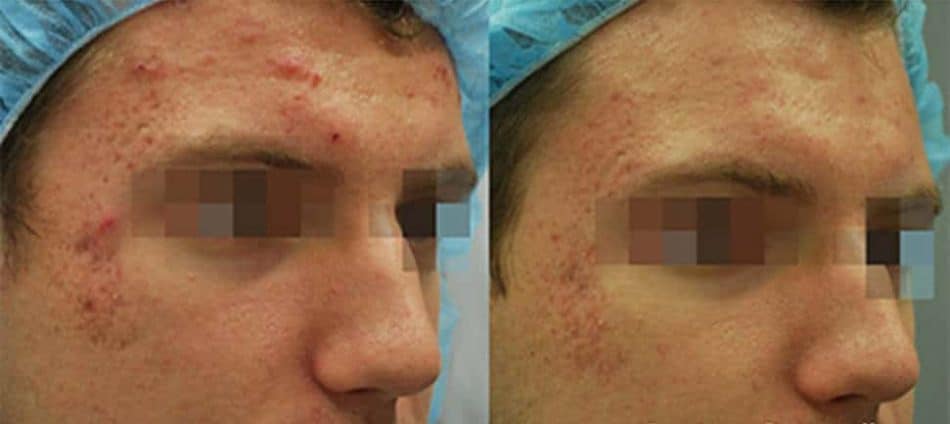
Before and after 2 treatments Fractora Active
(*Disclaimer: Results will vary from person to person.)
For further information on this exclusive first in UK treatment for active acne please contact the clinic on 03300 417 494.
(*Disclaimer: Please note that treatment results will vary from individual to individual.)
-
Vaccuum Follicle extraction
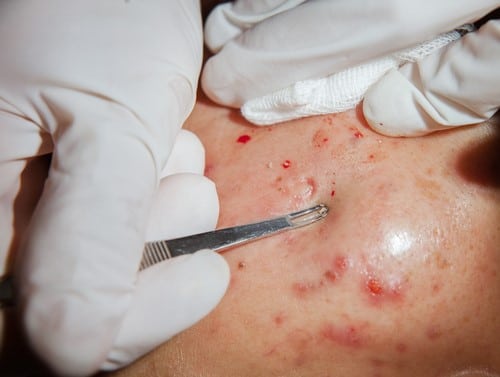
What Is Acne Extraction?
Acne extraction is a type of acne treatment procedure that is done in a doctor's office, using special, sterile tools to attempt to remove problem pimples.
The acne extractor is used to attempt to pull out the fluids or solids that are inside the pimple. The extractor puts pressure on the contents of the pimple, with the goal of expelling its contents.
When Acne Extraction Is Effective
Acne extraction is most effective on a type of pimple called a comedone - blackheads or whiteheads. These hard little bumps can be open (blackheads) which have a dark surface, or closed (whiteheads), which look white on the surface because the underlying hair follicle is completely clogged. Comedones make the skin appear rough or bumpy in texture.
One advantage of having acne extraction performed is that additional debris in the pores can also be removed.
Acne extraction is typically tried when other acne treatment methods - like oral or topical medications - are unsuccessful at treating very severe acne.
Acne extraction is not generally used to treat an inflamed pimple, like a pustule or papule, or comedones that are close to an inflamed pimple. This is because the procedure may spread the infection and make the problem worse in these cases.
The Pros and Cons of Acne Extraction
When this acne treatment is done correctly - by a professional in a sterile environment - it's a safe procedure. Acne extraction may help to clear up unsightly acne, and over time, even help prevent future acne breakouts when other preventive measures, like proper skin cleaning, are also used.
Steroid injections
Injections of corticosteroids may be used for treating large red bumps (nodules & cysts). This may help them to go away much more quickly.
Rosacea
The Solihull Medical Cosmetic Clinic is one of the leading clinics in the UK to treat Rosacea. With a whole range of different treatments, ranging from prescription medications and antibiotics prescribed by Dr Sagoo following assessment, to powerful medical grade IPL (intensed pulsed light) to dramatically reduce redness after 2-4 treatments (Limelight).

Limelight to dramatically diminish redness
We also treat moderate severe rosacea with fractional CO2 laser resurfacing, which may diminish large unsightly pores and may also improve the hyperplasia (overgrowth) of sebaceous (sweat) glands around the nose and cheeks.

C02 laser which may improve texture

ND Yag vascular laser which may diminish thread veins

We treat the dilated blood capillaries (thread veins) associated with rosacea using a powerful vascular Nd Yag laser, which aims to destroy the vessels by thermocoagulation.
We also have rosacea specific skin care product lines, which may help to control the irritation and sensitivity of rosacea on the face. These products are specifically designed with anti- inflammatory mediators that may have a soothing effect on the skin.
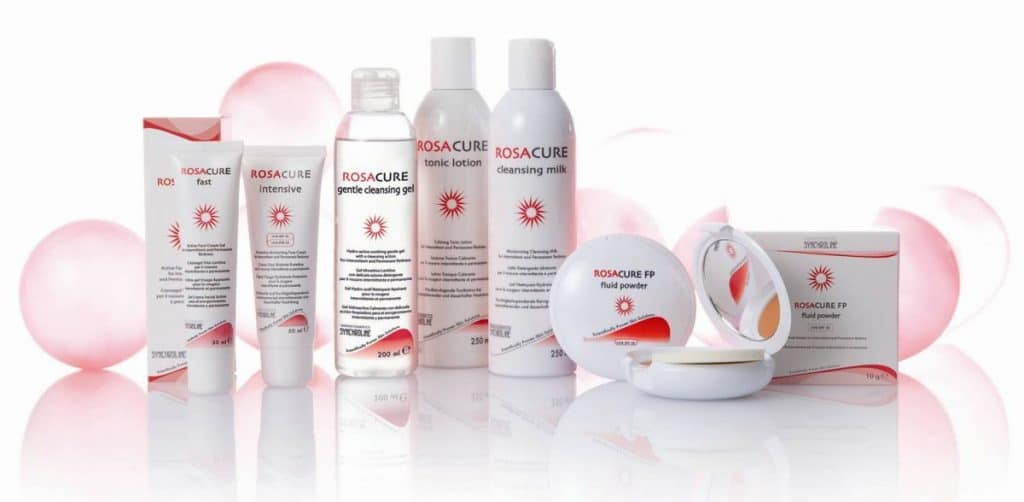
These are advanced treatments that are only carried out specifically by Dr Sagoo and his aesthetician.
Why we are the leading rosacea specialist clinic in the UK
- We only use the best medical grade IPL (intensed pulsed light) treatment in the world …the Limelight treatment which aims to target redness at a deeper level, which may dramatically reduce redness.
- Dr Sagoo has decades of experience treating rosacea patients and has so far treated hundreds of rosacea sufferers as a GP and a cosmetic doctor, with specially modified protocols through his experience.
- We understand the effects of Rosacea and its treatment. With many years of experience in Rosacea treatments, Dr Sagoo truly understands the psychological effects of the condition and how it can affect a sufferer’s confidence.
- We regularly receive many referrals from local GPs to our clinic.
- Many people come to us as a last resort thinking that there is no effective treatment out there. We work as a team, with our clients and monitor and review regularly as the treatment progresses.
- Dr Sagoo is a well-known experienced GP and can prescribe topical rosacea creams and gels as well as oral antibiotics, which evidence has shown to be effective for some patients. After a full medical history we sometimes prescribe medications, as the client's own GP may not be willing to.
- We also focus on the trigger factors of rosacea and try to inform and educate our clients.
Rosacea is a chronic condition and can affect all ages and both sexes, with lots also suffering pre-rosacea, flushing, blushing, thread veins and in some cases pimples. During the early stages the flushing can come and go but through further exposure to triggers, facial redness becomes more intense appearing often to look like mild sunburn or windburn. Tiny broken blood vessels and red bumps may also become visible in the reddened area and in more severe cases permanent redness, swelling, and burning sensations can occur.
The causes are unknown but a genetic predisposition (sensitive skin type) to reddening triggers is often at the route of development. Exposure to Ultra-Violet Light (UV), on sun sensitive skin types, is probably the number one cause of the condition while there are others triggers can be physical (exercise), chemical, environmental (wind and sun), metabolic (hormones) and diet (spicy foods, alcohol). We have a range of products and protocols designed to help to build tolerance to these mentioned triggers.

(*Disclaimer: Results will vary from person to person.)
Laser Genesis to improve the texture of the skin and reduce redness
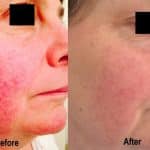
(*Disclaimer: Results will vary from person to person.)
Rosacea specific skin care products
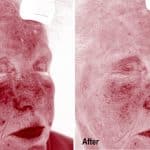
(*Disclaimer: Results will vary from person to person.)
UV images showing the extent of inflammation before and after treatment
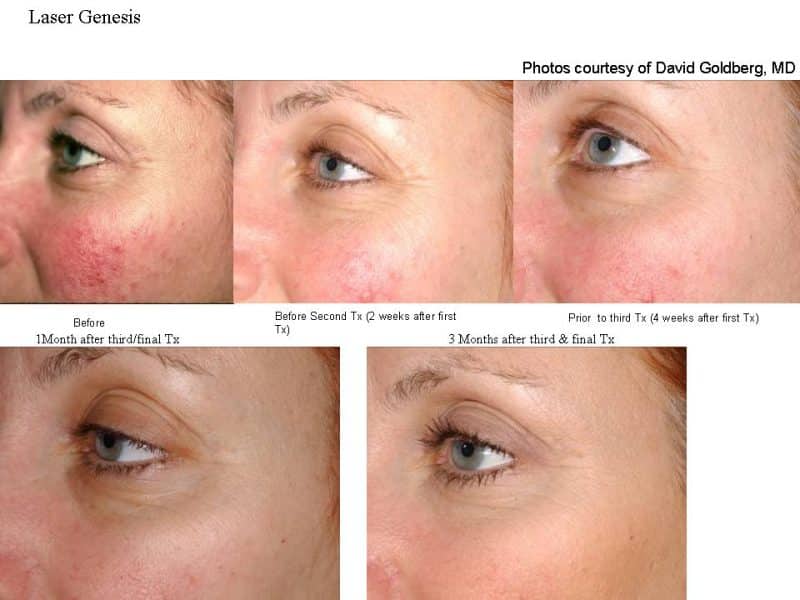
Before and after laser Genesis.
(*Disclaimer: Results will vary from person to person.)
What Is Rosacea?
Rosacea is a chronic skin disease that affects millions in UK. The cause of rosacea is still unknown and there is no cure. However, research has allowed doctors to develop a course of treatment that may effectively control rosacea by minimizing its symptoms.
There are four subtypes of rosacea. Each subtype has its own set of symptoms. It is possible to have more than one subtype of rosacea at a time.
Rosacea’s trademark is small, red, pus-filled bumps on the skin that are present during flare-ups. Typically, rosacea affects only the skin on your nose, cheeks, and forehead.
Flare-ups often occur in cycles. This means that you will experience symptoms for weeks or months at a time, the symptoms will go away, and then they will return.
The effects of rosacea go beyond skin problems; there is an emotional side to the disease as well. Surveys have shown these emotional consequences often weigh heavily on people with rosacea. In a survey performed by the National Rosacea Society that include over 500 people with rosacea, 42% reported feeling sad or depressed by the appearance of their skin. In this survey, rosacea was second only to weight gain as the top age-related concern, making it a greater source of anxiety than many other common concerns, such as wrinkles or thinning hair.
Types of Rosacea
Subtype one, known as erythematotelangiectatic rosacea (ETR), is associated with facial redness, flushing, and visible blood vessels.
Subtype two, papulopustular (or acne) rosacea, is associated with acne-like breakouts and often affects middle-aged women.
Subtype three, known as rhinophyma, is a rare form that is associated with thickening of the skin of your nose. It usually affects men and is often accompanied by another subtype of rosacea.
Subtype four is ocular rosacea, and its symptoms are centered on the eye area.
Symptoms of Rosacea
Rosacea symptoms are different between each subtype.
Signs of rosacea ETR:
- flushing and redness in the center of your face
- visible broken blood vessels
- swollen skin
- sensitive skin
- stinging and burning skin
- dry, rough, and scaly skin
Signs of acne rosacea:
- acne-like breakouts and very red skin
- oily skin
- sensitive skin
- broken blood vessels that are visible
- raised patches of skin
Signs of thickening skin:
- bumpy skin texture
- thick skin on nose
- thick skin on chin, forehead, cheeks, and ears
- large pores
- visible broken blood vessels
Signs of ocular rosacea:
- bloodshot and watery eyes
- eyes that feel gritty
- burning or stinging sensation in the eyes
- dry, itchy eyes
- eyes that are sensitive to light
- cysts on eyes
- diminished vision
- broken blood vessels on eyelids
What Causes Rosacea?
The cause of rosacea has not been determined. It may be a combination of hereditary and environmental factors. It is known that some things may make your rosacea symptoms worse. These include:
- eating spicy foods
- drinking alcoholic beverages
- having the intestinal bacteria Helicobacter pylori
- a skin mite called demodex and the bacterium it carries, Bacillus oleronius
- the presence of cathelicidin (a protein that protects the skin from infection)
Risk Factors for Rosacea
There are some factors that will make you more likely to develop rosacea than others. Rosacea often develops in people between the ages of 30 and 50. It is also more common in people who are fair-skinned and have blond hair and blue eyes.
There are also genetic links to rosacea. You are more likely to develop rosacea if you have a family history of the condition or if you have Celtic or Scandinavian ancestors. Women are also more likely to develop the condition than men. However, men who develop the condition often have more severe symptoms.
There are also known risk factors for rosacea. Whilst anyone can develop rosacea, these factors can alter your risk of showing symptoms:
| Family History | 30% of patients with rosacea have a family history of the disease. This means that if rosacea runs in your family, you’re more likely to have it yourself. Powell 2005 |
| Light Complexion | People with fair or light skin, especially those of Celtic or Northern European ancestry, are at greater risk. Powell 2005 |
| Age | People between the ages of 30 and 60 are more likely to develop rosacea, especially women of this age going through menopause. |
| Flushing | People that experience frequent flushing or blushing are more likely to be diagnosed with rosacea. |
Salicylic Acid Peels
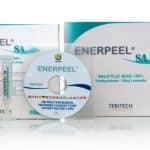
Acne is a skin disease that involves the oil glands at the base of hair follicles. The glands are stimulated by male hormones produced by the adrenal glands of both males and females. Hormonal changes lead to the skin becoming sensitive to a hormone known as DHT. The skin responds by increasing sebum production, and decreasing natural skin cell shredding, meaning dead skin cells clump together and form a plug in the pilo-sebaceous duct.
The skin bacteria start to digest the plug and produce by-products which cause inflammation. Bacteria are therefore not the cause of acne but it is their response to the changes in the skin which leads to spots. The Solihull Cosmetic Clinic has a range of products and treatment protocols designed to treat and control the symptoms and causes of acne.
-
TEBISKIN® Gly-Clean
– is a delicate cleanser with a keratoplastic effect designed to cleanse the skin in preparation for treating acne in cases where the skin is congested, with blackheads, whiteheads and where hyper keratinisation and hyper cornification may be an issue. Sensitive or angry skins may use Tebiskin® Sooth-clean.
-
TEBISKIN® Sooth-Clean
– is a delicate cleanser with anti-inflammatory properties specifically designed to cleanse skin post treatment. TEBISKIN® Sooth-Clean is particularly likely to be appropriate for patients with angry or sore sensitive skin. Uses non detergent based cleansing agents.
-
TEBISKIN® OSK –
is designed for the control of acne and seborrhea; especially inflammatory acne. It may inhibit inflammation, may have a significant antibacterial effect and may slow sebum production rates while also exhibiting a comedolytic effect that may reduce skin thickening.
-
TEBISKIN® UV-OSK –
is designed for UV protection in acneic patients while delivering an anti-acne activity by inhibiting bacterial colonisation and resisting the hydrolysis of tryglicerides and the consequent release of pro-inflammatory free fatty acids. SPF 30 UVa and UVb.
Enerpeel® Salicylic Acid –
- Designed to break down oil and surface debris in acneic skins
- introduces three key ingredients that may control inflammation
- may reduce the population of bacteria
- may reduce oil production
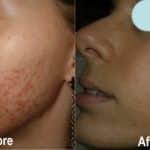
(*Disclaimer: Results will vary from person to person.)
For further information of our UK leading Rosacea Clinic please contact us on
03300 417 494.
(*Disclaimer: Please note that treatment results will vary from individual to individual.)
